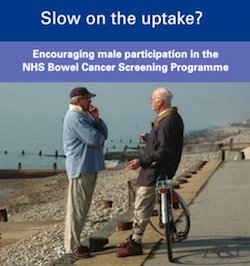My role
- About Us
Will men respond to the NHS's new bowel cancer campaign?
As the Forum publishes a new report on 'the paradox' of men and bowel cancer screening, the government launches a national bowel cancer campaign.
 The new report from the MHF, Slow On The Uptake?, highlights the paradox of bowel cancer. Although men are more likely than women to die from bowel cancer, they less likely to be screened.
The new report from the MHF, Slow On The Uptake?, highlights the paradox of bowel cancer. Although men are more likely than women to die from bowel cancer, they less likely to be screened.Men are 54% more likely than women to develop bowel cancer but only 52% of men have taken up the offer of screening compared to 58% of women. GPs, practice nurses and pharmacists, and sex specific information, are key to tackling the issue, say the Forum.
The research, funded mainly by the Department of Health, was published to mark Blue September.
Meanwhile, the government are encouraging men and women alike to face up to cancer following a U-turn on its ban on national advertising campaigns. A £4.5m NHS campaign Be Clear On Cancer, encouraging people with persistent loose or bloodstained stools – potential signs of bowel cancer, the UK's second biggest cancer killer, to visit their GP will run for eight weeks from January 2012.
Simple solution
The solution to the bowel cancer paradox is simple according to MHF CEO Peter Baker. 'In our research, both men and women told us they were would prefer information about screening that was written specifically for their own sex. Time and again, the importance of GPs, other primary care professionals and spouses or partners in men’s decision-making process was also mentioned,' he said.
Paul Burstow, the care services minister, said that 'embarrassment could well be the thing that actually kills people at the moment, and it shouldn't be'.
Be Clear On Cancer will run alongside the NHS Bowel Cancer Screening Programme which began in 2006 and covers the whole of England offering screening every two years to all men and women aged 60 to 69. How well will it do?
There are a few good ideas in the MHF's report:
- Men are less likely to take part in bowel cancer screening in most countries that have such programmes suggesting there is something ‘male’ about not taking part.
- When it was explained to them, men were more likely to see the test used (the faecal occult blood test – FOBt) as simple to do. The message about how simple and practical it is could be highlighted.
- For some men who feel fit and well, it may seem that the FOBt is either not relevant or that somehow there is 'more to lose' by taking it (because it might find something wrong).
- The inclination in men simply to 'deny' health concerns, either through inertia or unacknowledged fear, is not perhaps as commonplace as some people believe. Nevertheless, it is an important factor in some cases.
'Men invited to take part in the NHS Bowel Cancer Screening Programme should always make the effort talk to someone if they are not sure whether to take part,' advised Peter Baker. 'It might be that their initial instinct is to bury their head in the sand but a positive word from a relative, friend or health professional might be all it needs to persuade them to think more seriously.'
- Slow On The Uptake? can be downloaded from the MHF website.
- Be Clear On Cancer campaign
In This Section
Haringey health humour
I'd rather admit I love John Ryan!


 Donate to the MHF
Donate to the MHF
 Man MOT
Man MOT
Bowel cancer - alive thanks mainly to the screening programme
Although I had no symptoms, I was diagnosed with bowel cancer in December 2010, operated on in January, the cancer was completely removed without any need for chemo, and I was given a colostomy, so the restructured bowel would have time to heal. I came out of hospital in August 2011, having had my bowel put back in the usual place.
Around 38,000 new cases of bowel cancer are diagnosed each year in England and about 16,000 people die. Nine out of ten survive if it is caught early - but only half of those invited to take part in the NHS Bowel Cancer Cancer Screening Programme respond.
So there will probably be no need to be brave if you're sensible in the first place.
LEYS GEDDES